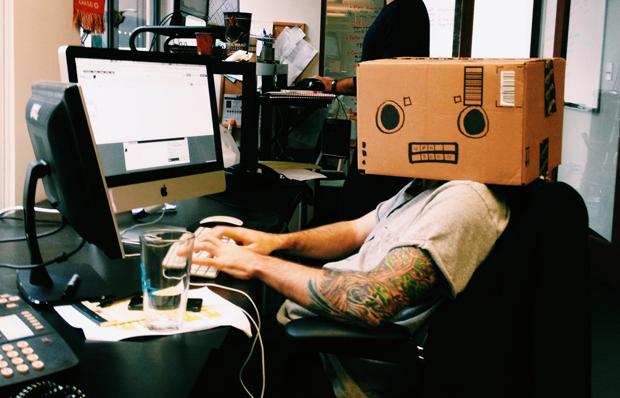
I once posted that liberals are not leftists (from an anarchist perspective but they didn’t know that) and it got hundreds of likes quickly because people thought I was insulting leftists!
Anyways, this is a fun and interesting video. I don’t think it tells us much we didn’t already know about work but there are some concepts in it that I was unfamiliar with such as the “seeking system” in brains that often get turned off during work. Many people try to keep these systems within our brain active with podcasts, the ones that help with curiosity and discovery. There’s a technical term for this system which psychologist Dan Cable identifies as the ventral striatum but I’ll just call it the “seeking system” for the sake of spellcheck and my sanity.
This seeking system can’t only be held aloft by podcasts, but they do get us thinking and concentrated on something else besides the menial and repetitive work we’re doing. I know when I’m listening to the NeoScum Podcast (a Shadowrun podcast) it helps me laugh, get myself out of my own head a little and make me think about a far away land. But it also doesn’t replace what’s going on in front of me with something better. It doesn’t take that mop out of my hand and give me a wand or make what I’m doing not menial, just a little more bearable.
These seeking systems are important because they help us learn and as a result, when they are minimized or even turned off we can get bored easier. Our brains are trying to tell us something, that it isn’t us but the work we feel as if we need to, as Cable puts it (paraphrasing), “…get through to make it to the weekend”. After all work is where we typically cannot be with our family, friends, loved ones, beloved hobbies or have the time to do as we please and go on a relaxing walk and explore what’s around us. Cable goes so far as to call this experience an “epidemic” and a “humanistic sickness” which tends to drive us to utter boredom.
One thing that frustrates me about his analysis though is that it focuses in not only on how this harms the workers but the organizations they’re a part of. He notes that this streak of boredom can result in a “lackluster performance” from workers but who cares? Shouldn’t the bosses get lackluster performances when they’re giving us lackluster work?
It’s like that saying goes, “Minimum effort for minimum wage!”
Cable traces back the origin of this boredom to the way work has been scaled up in the past few hundred years. Especially through supposed visionaries and industrialists like Henry Ford who, as Cable denotes, saw curiosity as a problem and a bug, not a feature of the workplace he wanted to build and thrive under capitalism. This kind of workplace breaks work into many small tasks which means that individual workers and even groups of them are all cut off from each other.
This likely reflects a capitalist’s dream of making it much harder for workers to communicate easier about their shared issues and then potentially forming a union and striking. This also led to the punishment/reward systems we tend to see these days in modern workplaces. The employee of the year for a punishment and a firm “talking to” or “notice” for valuing our own autonomy.
Generally, tedious and repetitive tasks are going to tend to drive you to listen to podcasts, music, the whirring of the ceiling fan above you that makes your office just a little bit too cold. It’s going to get your brain starved for things to think about, to process, to understand and discover. And through that starvation you’ll often be told that you are the problem in some way. Why don’t you get another job? Why don’t you go back to school? Why don’t you switch departments or talk to your boss? Anything but try to address the issue: Work itself.
Now, Cable claims that smaller companies tend to do better at increasing curiosity because the people involved are more likely to be engaged with their work. If there are only 50 people as opposed to 50,000 you won’t have the corporate decree of “stay[ing] in your lane” as much. And that seems plausible to some extent.
But even smaller businesses can fall into capitalist traps that punish workers for trying to flex their own autonomy in even the most basic ways. In fact, it can often lead to even worse micromanagement because the firm is much smaller and therefore the employees are much more legible to their bosses. And while Cable is surely right that the cultural expectations of a given company matter more than any given standard, those expectations are driven by economic ones.
Ultimately, tackling our cultural expectations around work, the way we victim-blame workers and laud bosses for making work as menial as possible, means tackling capitalism and work itself. Either through worker organizing, worker-owned organizations, individual slow-downs to preserve our own cranial integrity or maybe, just maybe, a revolution someday.
If you’d like to support me, donate a small monthly amount to my Patreon!